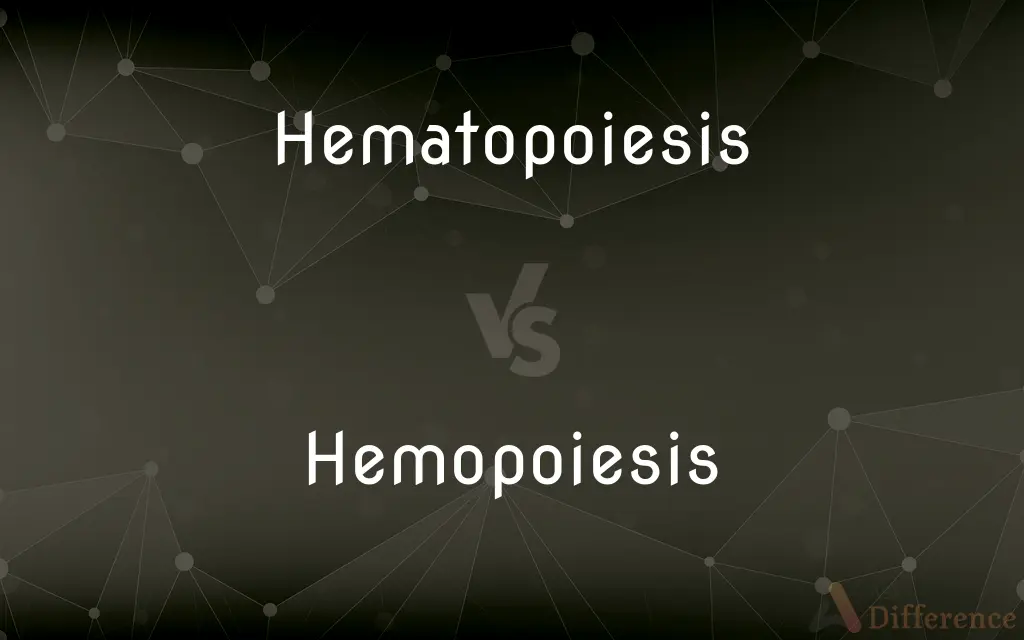Hematopoiesis vs. Hemopoiesis — What's the Difference?
By Tayyaba Rehman & Maham Liaqat — Updated on March 27, 2024
Hematopoiesis involves blood cell production in the bone marrow and lymphatic tissues, while Hemopoiesis is an older term for the same process.

Difference Between Hematopoiesis and Hemopoiesis
Table of Contents
ADVERTISEMENT
Key Differences
Hematopoiesis is the process of blood cell formation, occurring primarily in the bone marrow, where it produces red cells, white cells, and platelets. Hemopoiesis, on the other hand, is an alternative term historically used to describe the same biological process of blood formation but is less commonly used in modern medical literature.
The term hematopoiesis is more prevalent in contemporary scientific discussions, emphasizing the complexity of blood cell production, including the differentiation and maturation of various cell lines. Hemopoiesis, whereas, tends to be utilized more in historical contexts or in regions with specific linguistic preferences.
Hematopoiesis is intricately regulated by various growth factors and cytokines to ensure a balanced production of blood cells, reflecting the body’s needs. Hemopoiesis, while referring to the same regulatory mechanisms, is often discussed in a more general sense without delving into the specific factors involved.
The study of hematopoiesis has led to significant advancements in treating blood disorders, highlighting its medical importance. On the other hand, discussions around hemopoiesis, while still relevant, often do not capture the recent scientific advancements to the same extent.
Both hematopoiesis and hemopoiesis underscore the body's ability to maintain and regenerate its blood supply, showcasing the essential nature of this process. However, the term hematopoiesis is more aligned with current scientific research and understanding.
ADVERTISEMENT
Comparison Chart
Definition
The process of producing all types of blood cells in the body.
An older term for the process of blood cell production.
Location
Primarily in the bone marrow and lymphatic tissues.
Same as hematopoiesis, mainly in the bone marrow.
Usage
Preferred in modern medical and scientific literature.
Less commonly used; more historical or regional preference.
Research & Advances
Associated with recent scientific advancements in understanding blood diseases.
Less frequently associated with the latest research or scientific discussions.
Terminology
Reflects a more detailed understanding of the process, including specific cell types and stages.
Often used in a more general sense without detailing specific stages or cell types.
Compare with Definitions
Hematopoiesis
Primarily occurs in the bone marrow.
Hematopoiesis shifts from the liver to the bone marrow before birth.
Hemopoiesis
Fundamental for replacing aged or lost blood cells.
Hemopoiesis ensures the body's immune system is replenished with new cells.
Hematopoiesis
Ensures the constant renewal of blood cells.
Through hematopoiesis, the body maintains a stable level of white blood cells for immune defense.
Hemopoiesis
An older term referring to the formation of blood cellular components.
Hemopoiesis encompasses the production of both white and red blood cells.
Hematopoiesis
Key to blood disease treatments.
Understanding hematopoiesis is crucial for developing therapies for leukemia.
Hemopoiesis
Governed by the body's needs and external factors.
Hemopoiesis adjusts its pace in response to blood loss or infection.
Hematopoiesis
The process through which the body produces blood cells and platelets.
Hematopoiesis in the bone marrow is responsible for generating new red blood cells daily.
Hemopoiesis
Identical to hematopoiesis, mainly in the bone marrow.
In fetal development, hemopoiesis occurs in the spleen and liver before shifting to the bone marrow.
Hematopoiesis
Controlled by various hormones and growth factors.
Erythropoietin regulates hematopoiesis by stimulating the production of red blood cells.
Hemopoiesis
Crucial for historical understanding of blood diseases.
Studies on hemopoiesis have laid the groundwork for current hematological research.
Hematopoiesis
The formation of the cellular elements of the blood, including the red blood cells, white blood cells, and platelets, which in adult mammals takes place chiefly in the bone marrow.
Hemopoiesis
Variant of hematopoiesis.
Hematopoiesis
The process by which blood cells are produced.
Hemopoiesis
Formation of new cellular components of the blood in myeloid or lymphatic tissue.
Hematopoiesis
The formation of blood cells in the living body (especially in the bone marrow)
Hemopoiesis
The formation of blood cells in the living body (especially in the bone marrow)
Common Curiosities
What is hematopoiesis?
Hematopoiesis is the process by which all types of blood cells are produced in the body.
Where does hematopoiesis occur?
Hematopoiesis primarily occurs in the bone marrow and lymphatic tissues.
Is there a difference between hematopoiesis and hemopoiesis?
No significant difference; hemopoiesis is an older term for the same process as hematopoiesis.
Why is hematopoiesis important?
It's essential for maintaining healthy levels of blood cells and platelets, crucial for bodily functions.
How does hemopoiesis contribute to immune defense?
By producing white blood cells, hemopoiesis plays a crucial role in the body's immune response.
What role does erythropoietin play in hematopoiesis?
Erythropoietin stimulates the production of red blood cells, playing a key role in hematopoiesis.
How is hematopoiesis regulated?
It's regulated by hormones and growth factors, ensuring a balanced production of blood cells.
Can hematopoiesis occur outside the bone marrow?
Yes, especially during fetal development, hematopoiesis can also occur in organs like the liver and spleen.
How has our understanding of hematopoiesis changed over time?
Our understanding has evolved from a simple model to a complex view of cell differentiation and regulation.
What is hemopoiesis?
Hemopoiesis is another term for the production of blood cells, used less frequently in modern contexts.
What factors affect hematopoiesis?
Factors include the body's needs, infections, blood loss, and nutritional status.
Why might hemopoiesis be considered a historical term?
Because it reflects earlier understandings of blood cell production, before recent scientific advances.
How do diseases affect hematopoiesis?
Diseases can disrupt the balance of cell production, leading to conditions like anemia or leukemia.
What advances have been made in understanding hematopoiesis?
Advances include the discovery of stem cells and the regulation of blood cell differentiation.
Is hemopoiesis still used in medical literature?
It's used less frequently, with hematopoiesis being the preferred term in modern medical contexts.
Share Your Discovery

Previous Comparison
Dark vs. Darkness
Next Comparison
Stilting vs. StillingAuthor Spotlight
Written by
Tayyaba RehmanTayyaba Rehman is a distinguished writer, currently serving as a primary contributor to askdifference.com. As a researcher in semantics and etymology, Tayyaba's passion for the complexity of languages and their distinctions has found a perfect home on the platform. Tayyaba delves into the intricacies of language, distinguishing between commonly confused words and phrases, thereby providing clarity for readers worldwide.
Co-written by
Maham Liaqat














































